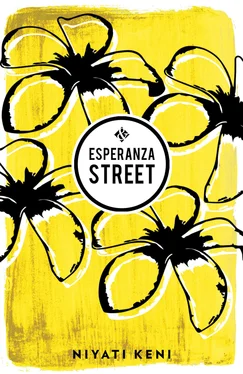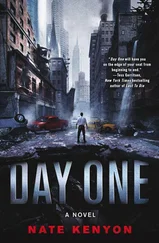America was to accompany Aunt Mary only as far as the jetty, where she planned to buy grouper and baby squid fresh off the boats. She preferred to run her errands early, before the sun grew strong enough to bring out her rash. With Aunt Mary gone, I knew she’d take her time returning. I’d noticed how she tired more quickly these days and had started leaving more of the work to me. The walls of the house seemed, she said, to want to close in on her, a feeling that only dissipated when she was outside. In the past month I’d come in more than once to find her in the yard, staring up at the sky. I didn’t mind if she wanted to stay out; there wasn’t that much to do. At dinner the evening before, our only guest had announced his plans to explore the backcountry for a few days on one of Earl’s hire bikes. The boys weren’t around either; Benny was at school and Dub had left early for the garage. So it wasn’t far into the morning when I found myself completely alone.
I enjoyed the times when I had the house to myself; it was such a rare sensation of stillness and one that had been unknown to me before I arrived at the Bougainvillea. Even if the day was hot, if I found myself there alone I would shut the sala windows to dull the street noise and lower the blinds halfway so that the room yellowed. And then I’d sit at the piano stool and wait as every object around me, with nothing to intrude upon it, nothing to compress it back down, seemed to swell before my eyes until it occupied its space more fully.
For a long while I pretended the house was mine, that I’d just bought it, and I surveyed the downstairs rooms as if deciding which furnishings, which colours would change; how I might rearrange things. When that game became a slightly bitter pleasure, I pretended instead to be a guest, newly arrived and soon to depart. And when finally I tired even of that, I took to inspecting the contents of Aunt Mary’s bookcases and then, more boldly, leafing through the family photograph albums that she kept in the sala.
There were two shelves of albums, containing generations of the Morelos and Lopez families: Uncle Bobby and Aunt Mary as a young couple, his hand at her elbow steering her to face the camera; Aunt Mary in school uniform playing jacks in the garden, the sun bright on her head; the boys as babies; and many more pictures of long-dead, un-named relations. In some of the images, landmarks of Puerto could be seen that, though old and much changed, were still recognisable: the passenger jetty, the basilica, the gates of the naval college. Over the years, I had looked through every album. I was fascinated by the pictures, returning to them again and again. There were so many. I possessed only one photograph, which was of my mother. And, like me, America also had only one, a group portrait of her family in the village, which she kept with her at all times, though she appeared in Aunt Mary’s albums at least every few pages, usually with the boys as children. I hadn’t thought so much about history, or heredity, till I came to the boarding house and first encountered these albums. I knew of course that everyone had to come from somewhere, that everyone had ancestors, yet the power of these photographs, the solidity they conferred, was undeniable. Aunt Mary, occupying her own place in this photographic lineage, could never have doubted she was somebody . It was a guilty pastime. I felt almost as if I were eavesdropping, as if I’d pressed my ear to the door of the past, but to someone else’s past, not my own.
There was one picture in particular that I sought out now, which unlike the others remained unmounted, having been slipped into the back sleeve of one of the albums, as if it were not for display yet couldn’t be discarded. I had found it quite by chance when I dropped the album at some slight noise, noticing as I picked it up again the protruding corner of the photograph and the slight ridge it made under the sleeve’s fabric. Each photograph, like everything in Aunt Mary’s house, had its place. Every album, every section, was dated. Many pictures were captioned: Bobby and I in Singapore; Mom and Aunt Elvie; Graduation; The De Souzas, London, 1972; Niagara! The exclusion of this picture meant that I couldn’t work out when it might have been taken, or whether it was someone Aunt Mary or Uncle Bobby had known when they were young, before even the boys came along. I imagined that I would come across the place left for it as I carried on looking, that I would restore it to its title: Girl under a yellow bell tree. It was an excuse, of course, to look.
The picture was of a young woman, at most a year or two older than I was now. She stood under the dappled shade of the yellow bell tree in the boarding-house yard. The picture had been taken at an angle, as if the photographer had knelt before her, so that about her face was a halo of blooms just starting to turn with, here and there, small seed pods already forming. She wasn’t dressed up for the occasion of the photograph yet her attitude seemed formal, an obeisance to the camera. She held her arms stiffly, without grace or purpose, by her sides. She was pretty with an open brown face and long black hair that had been swept to one side to lie flat against her shoulder like a curtain. She wasn’t smiling and looked, if not exactly unwilling, at least uncertain, unable to refuse. She didn’t look like a Morelos or a Lopez; her eyes lacked the self-assurance of the other portraits. Rather, she looked like any other pretty village girl with clothes slightly too big for her, her likeness snatched without ceremony. There was only the one photograph of her and I knew exactly which volume it was hidden in. I went straight to it now. I remembered details like that easily; it was me who Aunt Mary asked to fetch things she couldn’t find.
I was inspecting the girl’s picture when the sound of a key in the front door cracked the soft, still ochre of the room and, startled, I made to push it under a seat cushion. America walked into the sala. She took in the albums stacked on the piano, the one open on my lap, my hand sliding out of the upholstery. ‘Haven’t I enough to do without you making more of a mess?’ she said sulkily. She dropped the bag she had been carrying, pointed to it on the floor. I picked it up and carried it through to the kitchen. The bag smelled of fish. I unwrapped the grouper and baby squid and slipped them into bowls, covering them over with water. I left the bowls on the counter next to the sink. I was drying my hands when America burst through the kitchen door. ‘Have you any business at all looking at these, Mister?’ she said with unexpected ferocity. Her voice made me jump. ‘Where did you find it?’ She thrust a photograph at me, jerking it away again as I reached for it. The girl under the yellow bell tree. ‘The boys see it?’ I shook my head. ‘Tell the truth now!’ she shouted.
‘They haven’t been home all morning.’ My voice sounded wheedling. America glared at me. She stalked over to the Frigidaire and placed the photograph on top of it, pushing it as far back as she could. She had to stand on her tiptoes to do it. I looked away before she turned round again. She moved over to the counter and tossed the baby squid roughly into the sink. She turned the tap on full. Water spattered her blouse. I lurched forward and turned the tap down, retreating again quickly. America grabbed a knife. One by one she stabbed each squid between the eyes and squeezed out the ink, plunging them into the water to rinse them before dropping them back into the bowl. When she was done she moved away. I slid a plate over the top of the squid to cover them.
‘Who is she?’ I ventured.
‘I’ll tell her I caught you snooping,’ America said tautly without looking up. I didn’t repeat my question. America carried on working in silence, clattering dishes once or twice when I glanced over at the Frigidaire. Pretty soon I stopped looking, though I remained conscious of its white bulk as I moved round the kitchen during the afternoon.
Читать дальше












